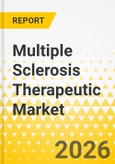Early symptoms often include vision problems such as optic neuritis muscle weakness, tingling or numbness, balance issues, and bladder dysfunction. As the disease progresses, individuals may experience severe fatigue, cognitive difficulties, mood changes, and, in some cases, partial or complete paralysis requiring mobility aids. Pain, though not always an initial symptom, is common and may result from nerve damage or muscle spasms.
The global Multiple Sclerosis Therapeutic market is being driven by several key factors. The growth of the multiple sclerosis (MS) therapeutics market is primarily driven by the increasing prevalence of MS worldwide and the rising geriatric population. As MS continues to affect a growing number of individuals - particularly young and middle-aged adults - the demand for effective treatment options is steadily increasing. Additionally, the expanding elderly population, who are more vulnerable to chronic and neurodegenerative conditions such as Amyotrophic Lateral Sclerosis is contributing to the sustained need for long-term disease management solutions. These factors are collectively propelling the development and adoption of advanced therapeutics aimed at improving quality of life and slowing disease progression in MS patients.
Despite its advantages, the growth of the Multiple Sclerosis Therapeutic market is restrained by certain challenges. The multiple sclerosis therapeutics market faces notable challenges that could hinder its growth trajectory. One of the primary concerns is the high cost of MS drugs, which can be a significant financial burden for patients, healthcare systems, and insurers - particularly in low- and middle-income regions. Many disease-modifying therapies (DMTs) are priced at premium levels due to their complex development and regulatory pathways. Additionally, side effects associated with MS medications, such as immune suppression, liver toxicity, and cardiovascular complications, can impact patient adherence and quality of life. These challenges underscore the need for more affordable, safer, and better-tolerated therapeutic alternatives in the MS treatment landscape.
The competitive landscape of the global multiple sclerosis therapeutics market is undergoing continuous evolution, fueled by advances in disease-modifying therapies, novel drug delivery systems, and a growing emphasis on personalized treatment approaches. Major pharmaceutical players such as Biogen, Novartis AG, Roche, and Teva Pharmaceuticals are leading the charge, alongside emerging biotech firms focused on innovative mechanisms of action and neuroprotective strategies. These companies are actively developing next-generation MS treatments aimed at improving efficacy, reducing relapse rates, and minimizing long-term disability. Innovations in oral therapies, long-acting injectables, and monoclonal antibodies are transforming the treatment landscape, offering patients more convenient and better-tolerated options.
The market is further shaped by increased awareness, early diagnosis through improved imaging and biomarker tools, and the growing global burden of MS - particularly in women and in regions previously considered low-risk. Companies are also investing in combination therapies and remyelination-based approaches, which hold promise for altering the course of progressive MS. As real-world data and digital health technologies gain traction, industry leaders are leveraging these tools to optimize treatment adherence, monitor patient outcomes, and enable precision dosing.
However, rising regulatory demands around safety, cost-effectiveness, and long-term data are pushing manufacturers to meet higher standards in both innovation and pharmacovigilance. In an era where patient-centred care and value-based outcomes are becoming central to therapeutic success, the MS therapeutics market is poised for significant expansion - driven by a pipeline rich in biologics, biosimilars, and neurodegenerative agents that aim to meet the unmet needs of a diverse and growing patient population.
Market Segmentation:
Segmentation 1: by Route of administration
- Oral
- Injectables
Segmentation 2: by Distribution Channel
- Hospital pharmacy
- Retail pharmacy
- Online pharmacy
Segmentation 3: by Region
- North America
- Europe
- Asia-Pacific
Another significant trend is the growing focus on personalized medicine, which is transforming MS care from a one-size-fits-all approach to more individualized treatment strategies. With a deeper understanding of genetic markers, disease phenotypes, and patient-specific responses, healthcare providers are increasingly tailoring therapy regimens to optimize outcomes. This includes the use of digital monitoring tools, biomarker-driven decision-making, and real-world data to guide treatment adjustments. As precision medicine gains traction, it is expected to play a critical role in improving both clinical and economic outcomes in MS management.
This product will be updated with the latest data at the time of order. Consequently, dispatch time for this product will be 7-10 business days.
Table of Contents
Companies Mentioned
- Biogen Inc.
- F. Hoffman-La Roche Ltd
- Novartis AG
- Teva Pharmaceutical Industries Ltd.








